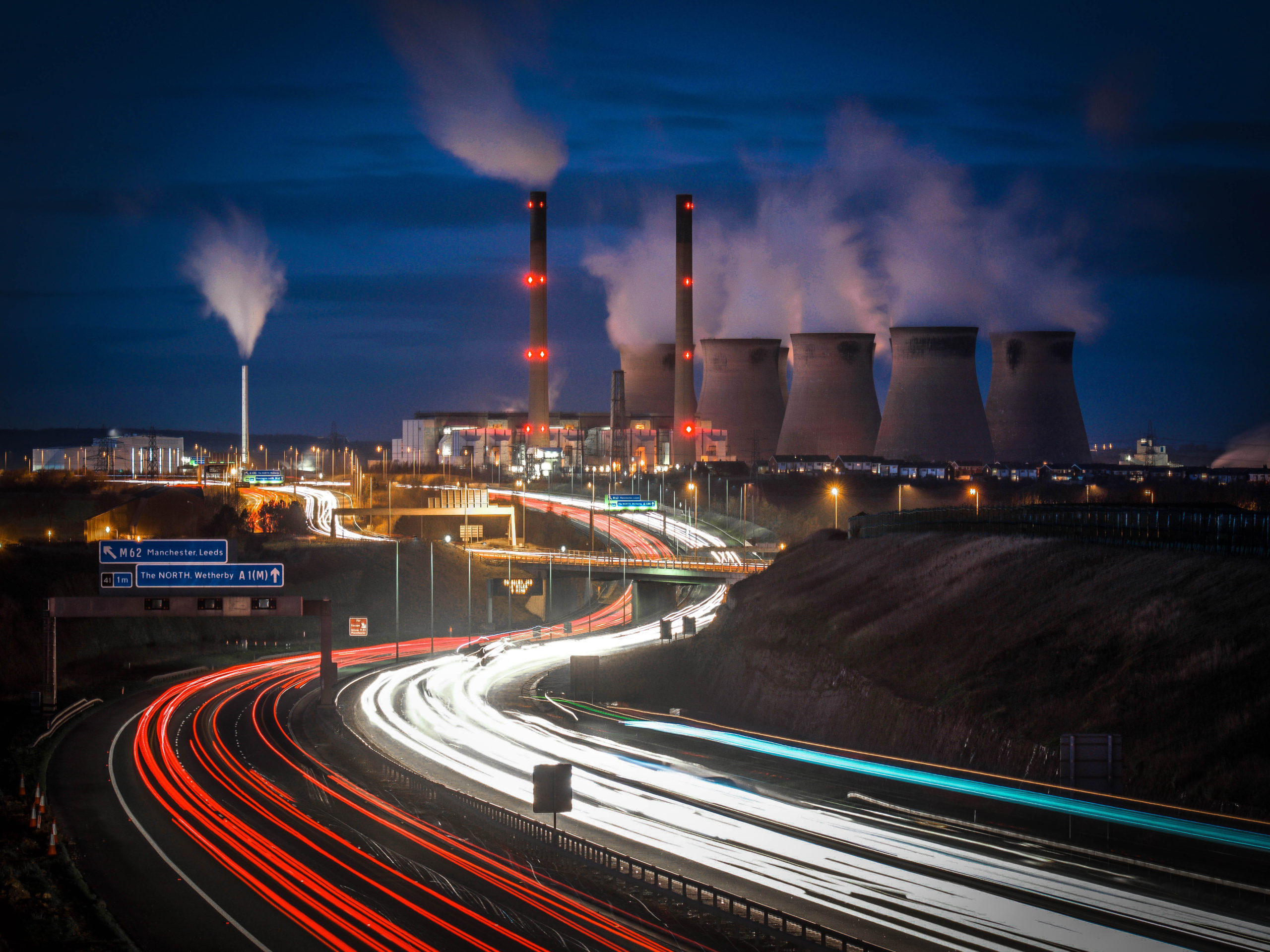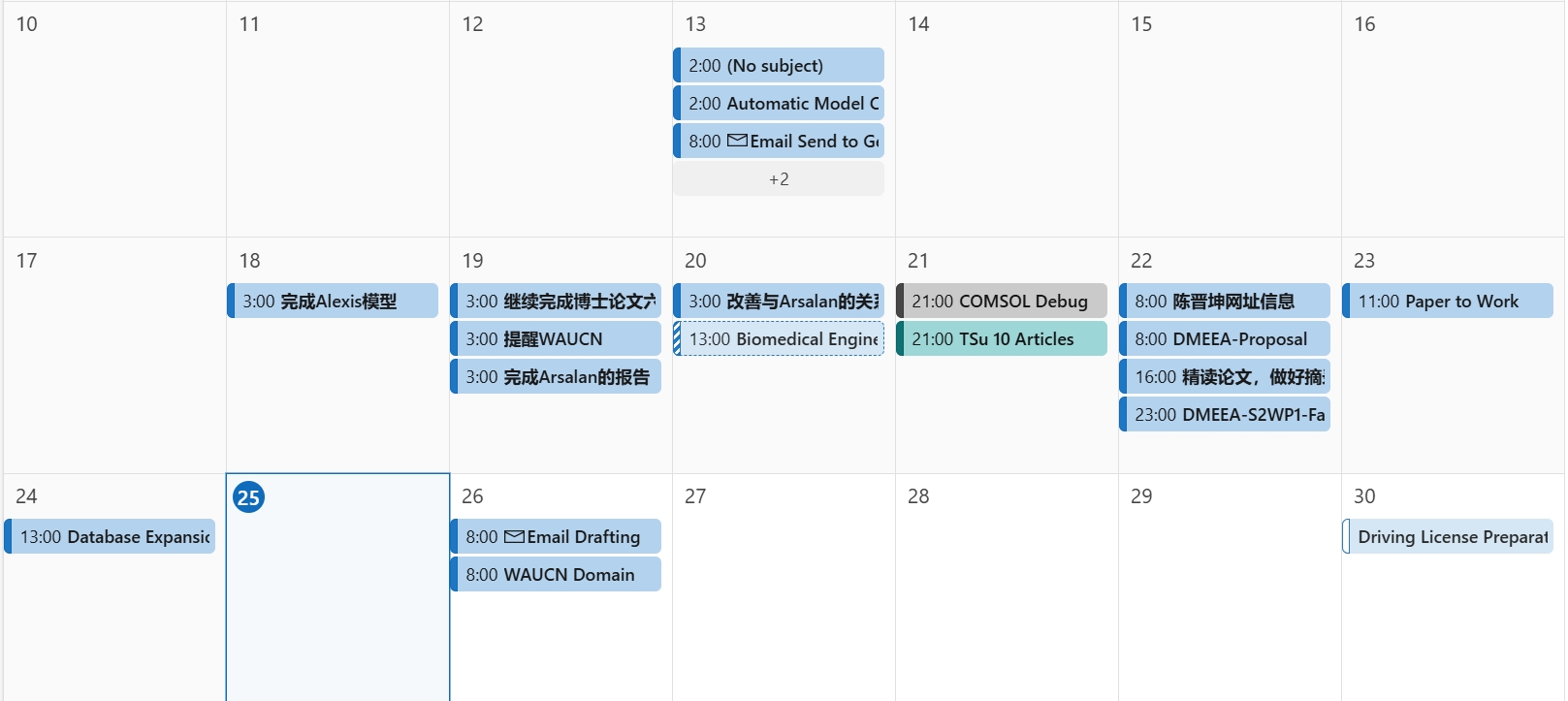Second Supervision and First Thesis Review
1. Key Achievements (Working Hours: 60)
| Task Focus | Percentage | Details |
|---|---|---|
| Core Research & Development | 50% | Second supervision, thesis drafting, and system model construction. |
| Professional Growth & Learning | 30% | Academic writing, chemistry departmental training, coding practicing. |
| Administration & Planning | 20% | Visa/CAS applications and related administrative tasks. |
Time Allocation Per Day
| Day | Task Description | Completion (%) | Time Invested (H) |
|---|---|---|---|
| Monday | COMSOL Model Construction (Hysteresis) | 🟩🟩🟩🟩🟩 (100%) | 4 |
| Simulink Model Construction | 🟩🟩🟥🟥🟥 (40%) | 4 | |
| Literature Review | 🟩🟩🟩🟩🟥 (80%) | 4 | |
| Tuesday | COMSOL Model Construction (Geometry & Testing) | 🟩🟩🟥🟥🟥 (40%) | 4 |
| PyBaMM Model Scanning Cycle Testing | 🟩🟩🟥🟥🟥 (40%) | 4 | |
| Email Drafting | 🟩🟩🟥🟥🟥 (40%) | 4 | |
| Wednesday | COMSOL Model Debugging | 🟩🟩🟩🟩🟥 (80%) | 4 |
| PyBaMM Report Generation | 🟩🟩🟥🟥🟥 (40%) | 4 | |
| Initial Database Collection | 🟩🟩🟩🟩🟥 (80%) | 4 | |
| Thursday | COMSOL Model Report | 🟩🟩🟩🟩🟥 (80%) | 4 |
| PyBaMM Report Generation | 🟩🟩🟥🟥🟥 (40%) | 4 | |
| COMSOL Model Search for Related Literature | 🟩🟩🟩🟥🟥 (60%) | 4 | |
| Friday | Munich Intersolar Conference Attendance | 🟩🟩🟥🟥🟥 (40%) | 4 |
| Supercapacitor COMSOL Model Development | 🟩🟩🟩🟥🟥 (60%) | 4 |
2. Detailed Progress Report
2.1. Research & Experiment (40%)
COMSOL Model - Full Cell Hysteresis:
- Continued work on the hysteresis loop model using COMSOL, targeting a detailed simulation to better understand hysteresis behavior in full cells.
- Ongoing adjustments for optimizing the model geometry and validation testing, with iterative debugging and refinement for accurate data.
Python Model - PyBaMM Code:
- Initiated cycle testing using PyBaMM, focusing on the efficiency of various simulation scenarios.
- Progressed in generating reports from the model and validating results with experimental data.
2.2. Learning & Training (30%)
- Time Investment: Dedicated 20 hours to training sessions and self-study.
- Academic Writing: Focused on structuring and refining thesis sections, enhancing coherence and precision in technical writing.
- Coding Practice: Explored advanced coding practices, including optimization techniques in Python, with direct application to model construction.
- Chemistry Departmental Training: Participated in training sessions covering energy-related chemical reactions, enhancing understanding of fundamental concepts.
- IEEE Learning Modules:
- Completed modules on recent advancements in energy storage technologies and sustainable system modeling.
- Integrated these concepts into ongoing research to align with industry standards and improve analytical approaches.
2.3. Administration & Business (20%)
Visa and CAS Applications:
- Finalized documentation for Visa and CAS applications, including preparation of financial and academic records.
- Corresponded with administrative offices to ensure timely processing, considering future travel and research commitments.
Accommodation and Relocation:
- Identified potential accommodation options near UCL to facilitate daily commute and focused work environment.
TSu Energy:
- Engaged in internal strategic meetings discussing TSu Energy’s current projects and sustainability goals. Focused on aligning company vision with ongoing research in energy decarbonization.
3. Faculty Profiles
Dr. Priscila Carvalho
Title: Lecturer in Environmental Law and Sustainability at UCL Energy Institute, Bartlett School of Environment, Energy and Resources (BSEER)
Profile Summary:
Dr. Carvalho brings a strong interdisciplinary approach, bridging law and science in energy and environmental sustainability. Her work spans regulated sectors, with significant experience in public-private partnerships and regulatory analysis. Her focus on decarbonization and resilience governance aligns with UCL’s sustainability goals.
Research Interests:
- Energy and environmental law
- Decarbonization strategies and governance
- Corporate law and sustainable resource management
Prof. Catalina Spataru
Title: Professor in Global Energy and Resources & Director of UCL Energy Institute
Profile Summary:
An internationally recognized expert, Prof. Spataru directs the Islands and Coastal Research Lab, addressing global energy decarbonization through a systemic approach. Her work integrates the energy-water-land nexus, providing innovative solutions for climate adaptation.
Research Interests:
- Climate resilience and adaptation strategies
- Decarbonization and green/blue economic models
- Energy resource nexus in coastal and island communities
4. Summary and Proposal
Last Week’s Achievements
- Completed conversation with the review panel, addressing key feedback on thesis structure and experimental approach.
- Progressed with paper rewriting, enhancing alignment with academic standards.
This Week’s Plan
- Finalize a comprehensive update report, with a focus on system-level model construction.
- Continue discussions with Prof. Sai GU on ongoing research topics.
- Schedule a follow-up meeting with the review panel for additional feedback.
This Month’s Goals
- Refine and upgrade research materials, focusing on data accuracy and model validity.
- Prepare for the upcoming viva, ensuring readiness in presenting core thesis arguments and research findings.

